cap-, cip-, capt-, cept-, ceive, -ceipt, -ceit, -cipient
(Latin: catch, seize, take, take hold of, receive, contain, hold; caught, taken prisoner)
Don't confuse the words in this cap-, cip- unit with those in the capit-, capt-, "head; leader, chief", or "first" unit of words.
capsulize (verb), capsulizes; capsulized; capsulizing
1. To express information in a very abridged or shortened form: Because time was short, Greg could only capsulize what he wanted to tell his friend.
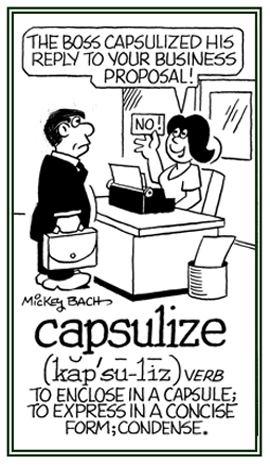
© ALL rights are reserved.
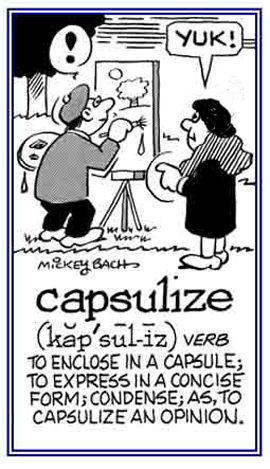
© ALL rights are reserved.
Go to this Word A Day Revisited Index
The radio station capsulized the news every hour.


Go to this Word A Day Revisited Index
so you can see more of Mickey Bach's cartoons.
1. A striving for favor or applause by flattery or praise: Bernice thought that Bill played the piano so well and told him so many times hoping that he would give her lessons, but these captations and compliments didn’t work because he just didn’t have enough time to teach her.
2. Etymology: from Latin captationem, from captatio, "a reaching after, a catching at"; from capatus; from captare, "to catch, to seize, to strive after".

© ALL rights are reserved.
Go to this Word A Day Revisited Index
2. Etymology: from Latin captationem, from captatio, "a reaching after, a catching at"; from capatus; from captare, "to catch, to seize, to strive after".

Go to this Word A Day Revisited Index
so you can see more of Mickey Bach's cartoons.
1. A brief description accompanying an illustration.
2. Translation of foreign dialogue for a movie or TV program; usually displayed at the bottom of the screen; such as, a printed explanation in a motion picture or on television; especially, a translation of dialogue accompanying a scene or an explanation preceding a scene.
3. To provide with a caption; for example, a photograph or a drawing.
4. A heading or subheading in a document or article.
5. An attachment to or heading of a legal document that identifies the circumstances of its production and the sources of its authority.
6. Etymology: from about A.D. 1384, "taking, seizure", from Old French capcion, from Latin capito; past participle of capere "to take".
2. Translation of foreign dialogue for a movie or TV program; usually displayed at the bottom of the screen; such as, a printed explanation in a motion picture or on television; especially, a translation of dialogue accompanying a scene or an explanation preceding a scene.
3. To provide with a caption; for example, a photograph or a drawing.
4. A heading or subheading in a document or article.
5. An attachment to or heading of a legal document that identifies the circumstances of its production and the sources of its authority.
6. Etymology: from about A.D. 1384, "taking, seizure", from Old French capcion, from Latin capito; past participle of capere "to take".
Its more recent meanings evolved from headings of legal indictments involving seizure ("Certificate of caption"); then the meaning, "the beginning of a document" and "the heading of a chapter or section of an article" has evolved; especially, in the U.S., to "a description or title below an illustration".
captious (adjective), more captious, most captious
Relating to being faultfinding; a negative word used to describe someone who tends to criticize everything that others are doing: As a captious perfectionist, Bonita tended to frustrate those around her with her constant disapproval of whatever they were doing.
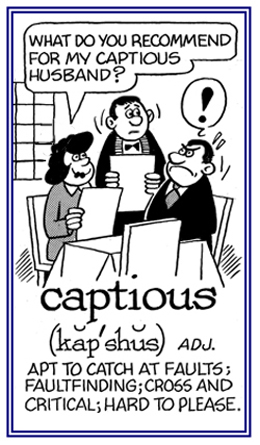
© ALL rights are reserved.
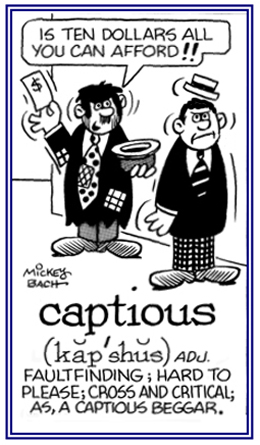
© ALL rights are reserved.
Go to this Word A Day Revisited Index


Go to this Word A Day Revisited Index
so you can see more of Mickey Bach's cartoons.
captivate (verb), captivates; captivated; captivating
1. To gain and to hold the attention of others by being extremely interesting, exciting, fascinating, or attractive: The textbook about biology has been captivating students in the teacher's class for years.
The singer captivated the audience with her beauty and wonderful songs.
The actress captivates the audience with her looks, voice, and dramatic flair.
2. Etymology: from Latin captivus, "caught, taken prisoner"; from captus, capere, "to take, to hold, to seize".
captivating (adjective), more captivating, most captivating
Concerning something which or someone who is fascinating, alluring, or interesting: The film shown on TV was so captivating and delightful for the children so they didn’t hear their mother call them to dinner!
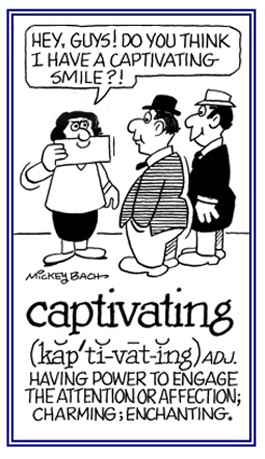
© ALL rights are reserved.
Go to this Word A Day Revisited Index

Go to this Word A Day Revisited Index
so you can see more of Mickey Bach's cartoons.
A feeling of great interest and liking for something that is considered to be wonderful and unusual: "The captivation of the politician made it easier for her to be re-elected as President of her country."
captive (adjective)
Someone who is held in confinement, a prisoner: The police held the man captive while they completed their report of his criminal activities.
A battery that has an immobilized electrolyte which is gelled or absorbed in a material.
capture (verb), captures; captured; capturing
1. To take by force or surprise, to seize: The police captured the bank robbers just before they were about to make their getaway.
2. To grasp the essence of something: With a few strokes of his brush, the artist was capturing the woman's appearance in the portrait.
2. To grasp the essence of something: With a few strokes of his brush, the artist was capturing the woman's appearance in the portrait.
1. A container for carrying or displaying items, often clear or transparent: "The unique rock collection was in a glass case in the museum so visitors could appreciate it."
2. Etymology: from late Middle English, from Old French casse, chasse; from Latin capsa, related to capere, "to hold".
2. Etymology: from late Middle English, from Old French casse, chasse; from Latin capsa, related to capere, "to hold".


